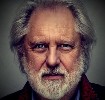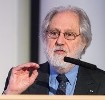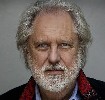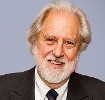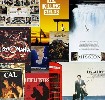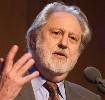Brexit would be a disaster for Ireland and UK
A vote to leave the European Union would hurt this country every bit as much as the UK, writes David Puttnam
A month ahead of the referendum in the United Kingdom on its membership of the European Union, and writing as someone who is able to effortlessly regard each of these neighbouring islands as home, I find myself increasingly concerned about the possible outcome from the perspective of both British and Irish citizens.
Despite being a member of the House of Lords, on this occasion I'll be able to vote and I will be firmly ticking the 'Remain' box on June 23. The choice is an easy one for me.
It's informed both by my daily experience of life and a sincere belief that the colossal decision facing us is, in terms of its political, economic and social ramifications, the most important to be made in a generation.
While I don't for one moment take for granted the voices and opinions of multiple business leaders and those many others who have voiced their opposition to 'Brexit', I tend to view the referendum from the perspective of the world I know best: that's to say its likely effect on jobs in the film, TV and other creative industries.
I know enough to be thoroughly convinced that life outside the EU would massively impoverish the United Kingdom, both culturally and financially.
I think, at the very minimum, 'Brexit' raises a number of questions to which I've yet to hear any remotely satisfactory answers.
For example, as someone who's passionate about education, I wonder if British universities would lose out on the vital research funding that's provided by EU programmes, such as Horizon 2020?
Equally, as someone who lives in both Cork and London, I've come to recognise that the destiny of our two islands is uniquely intertwined, and though borne from a complex and difficult history, the relationship is thriving as never before. We even joined the EU on the same day! Sadly, the uncertainty which a 'Brexit' result would inevitably deliver raises serious questions about the future stability of this relationship; and that holds true in a number of spheres.
The most immediate concerns arise as a result of the shared border, across which any amount of business is now conducted efficiently and with increasing ease.
Indeed the peace process itself, along with many of its resulting benefits, have been supported by the EU to the tune of €1.5 bn.
The fourth 'peace programme' is due to run until 2020. Who's to tell if this will be in jeopardy?
There are other incredibly serious issues regarding the movement of people which would need to be addressed.
How, for example, would the 'Common Travel Area' be affected, even temporarily? What would be the impact on the eligibility of Irish and British citizens to live, work and study on either island?
The EU has announced it's abolishing roaming charges across Europe from June 2017. Would an EU exit mean that these charges could still apply on this island, and beyond, and for all travellers to the UK?
Dozens and dozens of questions such as these, small and large, would have to be addressed and resolved.
Business leaders in Ireland, North and South, have identified other troubling concerns, such as the effects on currency exchange, energy costs and tourism.
As Ireland's Digital Champion, I've witnessed at first-hand the importance of the Digital Single Market and the significant opportunities it brings in helping people and communities, in both islands, to develop the skills and competences which are increasingly essential to any hope of a successful 21st century future.
I know that Irish people across the board are very supportive of Ireland's membership of the EU. An opinion poll carried out by Red C for European Movement Ireland in 2015 showed that 84pc of those living in Ireland believe that membership of the EU has benefited the country. Spending a portion of every week in both places, I can attest to the fact that what's good for Ireland is also good for Britain.
The clearest evidence of the close historical ties between our two islands is that some half a million Irish-born people now living in Britain have the right to vote in next month's referendum.
I hope that they will thoughtfully use this opportunity, and the significant responsibility that comes with it.
A group made up of people from a variety of backgrounds has formed 'Irish4Europe' and is working hard to ensure that the Irish in Britain are aware of their right to vote, and urging them to do so.
For my part, as well as voting 'Remain' next month, I'm taking part in the European Movement Ireland's #PhoneAFriend campaign.
I feel compelled, in what I regard as the interests of sanity, to urge all of the young and not so young Irish in Britain to please register to vote by the June 7 deadline.
As someone who is now happily tucked into in my 'Third Age' I feel an enormous responsibility to future generations. In casting my vote next month, I'm particularly mindful of the legacy we'll be leaving behind for them.
I include in this the enormous multi-faceted challenges facing our planet as a whole, not least climate change; a growing humanitarian refugee crisis; and the fragility inherent in the co-existing issues of an aging population and youth unemployment.
As I'm sure is by now clear, I'm personally convinced that this is not the time for the United Kingdom to make a once-in-a-generation decision to cut itself off from the rest of our continent.
I believe it's incumbent upon all of us who care about the continuing peace and prosperity of our communities to offer leadership and genuine innovation in drawing our countries closer together, rather than attempting to push them apart.
For all of these reasons and more, I urge – in fact I beg – everyone who can, to register to vote, and exercise their democratic duty with the very greatest care and consideration on June 23.
Written by David Puttnam
Source: Sunday Independent


